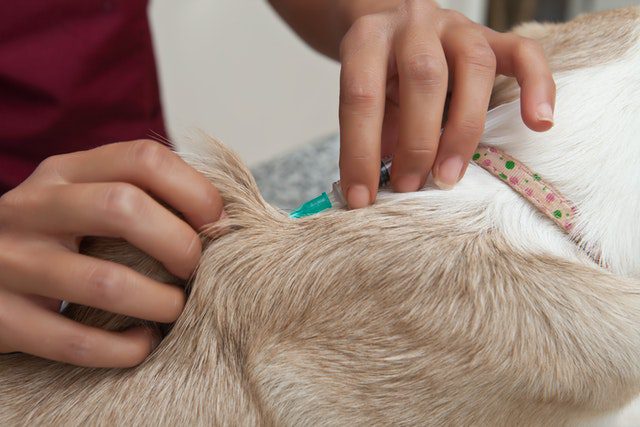Pet Vaccinations
We all agree that preventive care is one of the most critical aspects that help maintain pets’ overall health. When we talk about preventive care, it refers to vaccination as it helps prevent infectious diseases and many other potential illnesses. Pet vaccinations serve as a preventive layer to combat several infectious and viral diseases such as rabies, Parvovirus, Lyme disease, etc. Vaccinations are essential for kittens, puppies and other pets having a weak immune system because of their young age. At Sunshine Pet Hospital, we offer all types of pet vaccination services in Aurora, IL, administered by our expert team of veterinarians.


When Should My Pet Get Vaccinated?
As we have discussed earlier, Pet vaccinations are necessary for pets at a young age due to their weak immune system. These vaccinations usually begin at 6 to 8 weeks of age to protect against infections and viral diseases. Our professional team of doctors at Sunshine Pet Hospital will determine the best vaccination plan for your pet’s health. Remember, proper vaccine administration and giving vaccines at the correct age are very important to ensure proper protection. However, it’s also important to consider the pet’s clinical condition to ensure the pet’s maximum safety before giving vaccinations.
Why Are Pet Vaccinations Important?
Pet vaccinations are a preventive measure against several diseases and infections. Here are the following most common medical conditions that vaccinations can prevent.
Rabies:
Rabies is a widespread disease found in both mammals and humans. It’s a fatal disease that can be prevented by appropriate vaccination at the correct time.
Distemper:
Distemper is a widespread virus, and almost every dog is exposed to it once in a lifetime. It’s a fatal virus that often attacks organs including the nervous system. The most common symptoms of distemper are vomiting, coughing, diarrhea and tiredness. At Sunshine Pet Hospital, we offer anti-distemper vaccinations to prevent this deadly illness, which can also cause death in its early stages.
Hepatitis:
Like humans, the hepatitis virus can also spread between dogs through urine, feces, and sexual secretions. In most cases, it damages the liver in pets and can also turn fatal in severe cases. You should get your canine vaccinated for hepatitis as it’s becoming more common in many communities.
Parvovirus:
Parvovirus is very dangerous for young puppies and often causes symptoms such as vomiting and diarrhea, and it can even cause death. It’s a highly contagious virus that can spread through feces and survive outside the pet’s body for an extended time. If you are a proud pet parent of a puppy, you must discuss the vaccination plan with your veterinarian to prevent parvovirus.
Feline Leukemia Vaccination
Feline Leukemia vaccination protects cats from a deadly cat virus called feline leukemia. It’s a form of a virus that is more common in outdoor cats, but in some rare cases, it’s also found in indoor cats. Your cat might be at risk of getting feline leukemia if he spends more time outdoors. At Sunshine Pet Hospital, we offer yearly boosters to prevent this virus in cats by maintaining high levels of antibodies through vaccination.
Remember, these were the most common pet vaccinations that we have discussed. Sunshine Pet Hospital offers all types of pet vaccination services available for cats and dogs.
How Are Vaccines Administered At Sunshine Vet Hospital?
Pet Vaccinations are administered in a series of multiple shots through subcutaneous injection or orally, depending upon the types of vaccination. At our hospital, a team of veterinarians performs a complete examination to ensure the stability of the pet’s condition before administering the vaccine. We also ensure the appropriate and timely administration of pet vaccines to ensure the utmost protection against diseases and infections. You can schedule an appointment at Sunshine Pet Hospital in Aurora, IL to know about your pet’s vaccination schedule.

